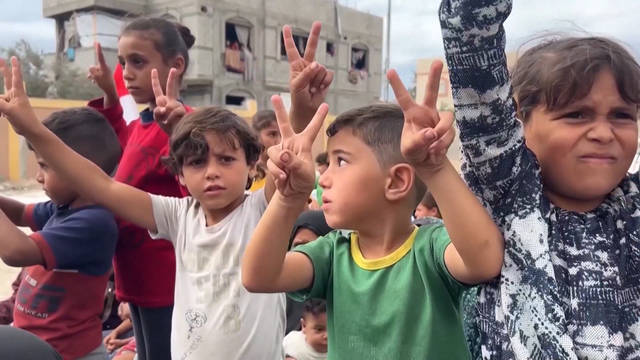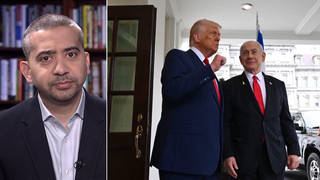
By Amy Goodman & Denis Moynihan
The bombing has stopped in Gaza. Palestinians there, still waiting for the food and other aid to reach them, are now sifting through the rubble of their homes seeking their dead. In Israel, twenty families reunited with their loved ones who endured two years of captivity in Gaza following October 7th, 2023. Their pain and joy received blanket coverage in the US, and rightly so. But the ongoing suffering of the Palestinians rarely appears in the mainstream US media. It is absolutely essential that people here, the source of Israel’s arsenal, have access to the full breadth of debate on the Israeli-Palestinian conflict.
One experienced participant in the Middle East peace process is Palestinian human rights attorney Diana Buttu. On the first day of the ceasefire, she said on the Democracy Now! news hour,
“While people here are elated, happy that the bombs have stopped, we’re also at the same time worried, because we’ve seen that the international community, time and again, has abandoned us. Everybody is happy that the Israelis are going home, but nobody’s talking about the more than 11,000 Palestinians who are currently languishing in Israeli prisons, being starved, being tortured, being raped.”
A strikingly similar analysis came from the uncle of one of the Israelis taken captive on October 7th. Joel Beinin is an emeritus professor of Middle East history at Stanford University. His niece Liat Beinin Atzili was held captive for 54 days in Gaza in 2023. The family’s story is the focus of a new documentary, Holding Liat.
“The world media focuses on the Israelis,” Joel Beinin said on Democracy Now! “There’s always a serious imbalance in coverage and centering Israel and Israelis, and much less attention to Palestinians. Palestinian society, as a whole, is suffering far, far more than Israeli society has ever suffered as a result of the armed clashes, going back all the way to 1948. That’s something that we in the West don’t tend to have adequate appreciation for.”
US media outlets interview current and former Israeli ambassadors to the US, US ambassadors to Israel, and policy analysts and so-called experts on the Israel/Palestine conflict. But prominent Israeli critics of Israeli government policies are rarely heard.
As President Trump spoke to the Israeli parliament, the Knesset, this week, two members silently held up signs that read, “Recognize Palestine.” The chamber erupted as they were escorted out, their colleagues shouting in unison, “Trump! Trump! Trump!”
The two were Ayman Odeh, an Israeli Palestinian, and Ofer Cassif, an Israeli Jew, both members of the Hadash-Ta’al coalition.
“Yesterday, there was a disgusting display of flattery and personality cult by two megalomaniacs who are hungry for power and blood. That’s the main bond between [Israeli Prime Minister] Netanyahu and Trump,” Ofer Cassif said on Democracy Now!. “This was a minimum — and, I would say, even polite — protest against the policy of mainly the government of Israel, the genocidal government of Israel, the government that sacrificed the Israeli hostages and the even Israeli soldiers on the altar of a messianic, crazy ideas…taking place under the auspices of the governments of the United States, in plural — Biden and, later on, Trump.”
The most vital voices to hear in any conflict are its victims, those at the target end of the weapons. Israel made it very hard to hear from Palestinians in Gaza, by preventing foreign news organizations from entering, and, tragically, by killing Palestinian journalists in Gaza on an unprecedented scale, with over 250 killed since October 7th, 2023.
Palestinian human rights activist Ahmed Abu Artema spoke to Democracy Now! this week from exile in Amsterdam after recently escaping Gaza. He helped organize the nonviolent 2018 Great March of Return in Gaza, using the tactics of Gandhi and Martin Luther King, Jr. The march was violently suppressed by the Israeli military.
“The essence of the problem [is] dehumanizing us, dehumanizing the Palestinians,” Ahmed said. “We lost our beloved ones. We lost our houses. We lost everything. So, it sounds like there are people who deserve life — Israelis — and there are people who don’t deserve life, in the perspective of Trump and the perspective of this colonial Israeli government.”
Ahmed survived this latest assault on Gaza, but his 12-year-old son, Abboud, did not. He was killed with five other family members in an Israeli airstrike on October 24, 2023, that also injured Ahmed and many others. “This is an example of the daily Israeli bombing against Gaza,” Ahmed told us at the time from his hospital bed.
When you hear people speaking from their own perspectives, whether a Palestinian father, or an Israeli-American uncle, it breaks down barriers to understanding. You become less likely to want to destroy them. That is why we need a media that reflects the full spectrum of debate, the full range of voices. Without that, peace, in the Middle East and elsewhere, will remain beyond reach.












Media Options